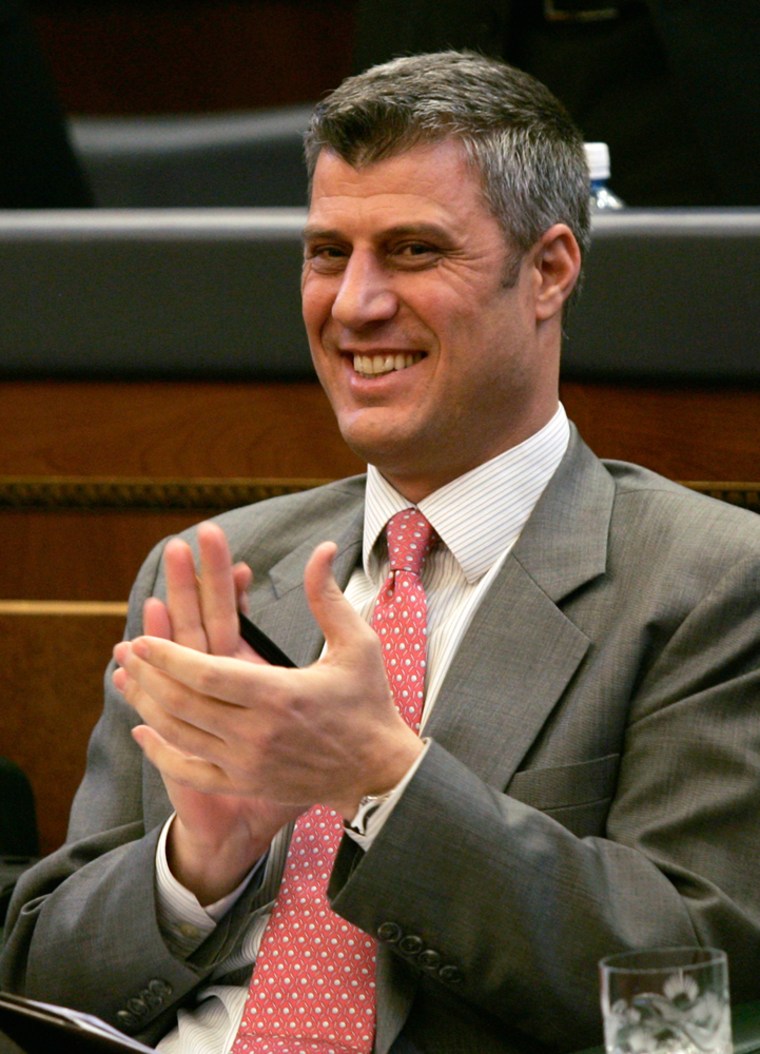Kosovo's parliament elected former rebel leader Hashim Thaci as prime minister on Wednesday in a vote foreshadowing a declaration of independence from Serbia.
Thaci, 39, was elected by a vote of 85-22 to head a coalition government that will try to steer the province through a declaration of independence — a course supported by the United States and some European governments but fiercely opposed by Serbia and Russia.
"Our aim is to make Kosovo independent in the first part of this year," Thaci told lawmakers. "We will make our dream and our right come true soon. ... Kosovo will be independent."
Thaci said that the timing for a declaration of independence was "an issue of weeks," but cautioned that no move would be made without the approval of the United States and key European powers.
"Kosovo will do nothing without Washington and Brussels. No unilateral actions," Thaci said in an interview shortly before Wednesday's vote.
Thaci's party to control seven ministries
Thaci is Kosovo's fifth prime minister since the southern Serbian province came under U.N. administration. The U.N. took control of Kosovo after a 78-day NATO bombing campaign in 1999 that ended a Serb crackdown on separatist ethnic Albanians.
Thaci's Democratic Party of Kosovo, which won the most votes in November elections, will govern alongside its main opponent, President Fatmir Sejdiu's Democratic League of Kosovo.
Earlier Wednesday, Sejdiu was re-elected to his post as president, defeating an opposition candidate in the third round of the secret vote, which required a simple majority.
Amid thunderous applause the newly elected Cabinet stood as they took an oath in the province's assembly in the capital, Pristina.
Both parties support statehood for the province, whose population is more than 90 percent ethnic Albanian. Jointly, the parties will hold 62 seats in the province's 120-seat assembly.
Thaci's party will control seven out of 15 ministries, including finance, economy, energy and education.
Sejdiu's party will run five ministries, including justice and health. Sejdiu took control of the Democratic League of Kosovo after the death two years ago of Kosovo's first president, Ibrahim Rugova.
Bitter rivals
The partnership between the two is likely to be an uneasy one because of bitter rivalries inherited from the war.
Minority ethnic Serbian parties will run the Social Welfare Ministry and the department dealing with the return of ethnic Serbian refugees who fled Kosovo after the 1998-1999 war. Another ministry will go to representatives of the Turkish minority.
During his speech, Thaci appealed to the dwindling Serbian minority to consider Kosovo their home, and in a symbolic effort to reach out to them he switched from speaking Albanian to Serbian at one point.
"Kosovo is a homeland to all its people," Thaci said in Serbian.
Western diplomats have pushed for the creation of a broad coalition, which they see as a guarantee of stability as Kosovo moves closer to independence.
No declaration is likely before Serbia's presidential elections Jan. 20, and the likely run-off Feb. 3.
Kosovo's problems continue
Serbia, backed by Russia, insists that Kosovo — considered the cradle of Serbia's medieval state and religion — should remain part of its territory.
International envoys failed last year to resolve Kosovo's political future. Russia, Serbia's ally, has threatened to veto any U.N. Security Council measure allowing Kosovo to become a country.
During the Kosovo conflict, Thaci emerged as the political leader of the armed rebel group in 1997 as it claimed responsibility for a series of attacks on Serbian authorities.
Known by the nom de guerre "the Snake," he came to be compared to Gerry Adams, leader of the political wing of the now-disbanded Irish Republican Army.
Thaci — born in Kosovo's central region of Drenica, regarded as the heartland of the ethnic Albanian armed resistance against Serb authorities — was included in talks to end the war at a U.S.-backed peace conference in France in 1999.
Former Yugoslav leader Slobodan Milosevic's discriminatory politics and his brutal campaign on civilians as he tried to wipe out the rebels boosted ethnic Albanian support for the insurgency and pushed it into a full-blown war in 1998. The fighting that ensued placed Kosovo high on the agenda of the international community.
